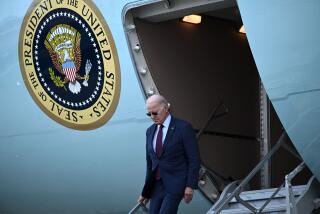A smarter stimulus
Two things seem certain as congressional leaders formulate a new economic stimulus proposal with President-elect Barack Obama: The bill will become law, and it will cost a prodigious, deficit-doubling amount of money. We understand the reasoning behind the push for a fiscal pick-me-up that’s massive in scale; it takes a lot to move a $14-trillion economy that’s faltering as badly as this one. Nevertheless, we’re worried that the proposal is missing something important. It needs to help revive the economy, certainly, but it also should have a larger ambition. It should help build a strong, 21st century foundation for U.S. businesses and workers so they can compete more effectively in global markets.
As Obama heard repeatedly on the campaign trail, communities in many parts of the country are ill-prepared for the changes wrought by globalization. Many voters urged him to stop the erosion of U.S. manufacturing, protect struggling industries against foreign competitors and make it costlier for employers to export jobs. But the capabilities of developing nations are steadily advancing, so there’s no way to stop the next industrial revolution. We need to equip students, workers and communities for that revolution. For starters, that means making broadband networks as ubiquitous and robust as they are in other developed nations. It means improving math and science education, and retooling vocational training programs.
Obama shares some of this ambition -- witness his interest in promoting renewable energy sources through the proposal’s spending and tax provisions. But some of the biggest spending programs being discussed would simply use federal dollars to help states and cities maintain the status quo. Yes, there are bridges that need to be repaired and highways that need more lanes. But let’s also build smart highways and vehicles that move people and freight faster and with fewer accidents. Yes, there are state health programs running out of funds. But let’s speed the computerization of medical records and treatment systems to get more out of our healthcare dollars. As we struggle to pull ourselves out of this recession, let’s not aim for the bottom rungs on the ladder.
More to Read
A cure for the common opinion
Get thought-provoking perspectives with our weekly newsletter.
You may occasionally receive promotional content from the Los Angeles Times.










